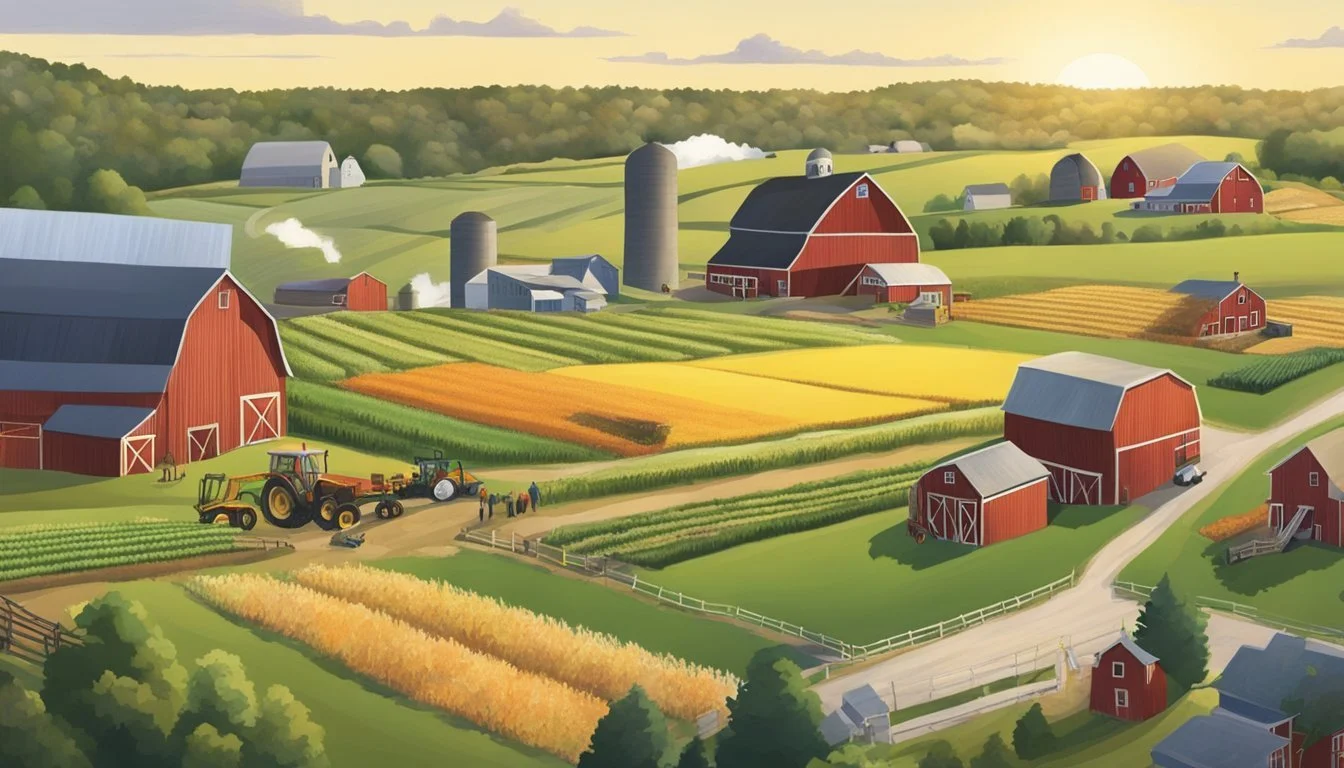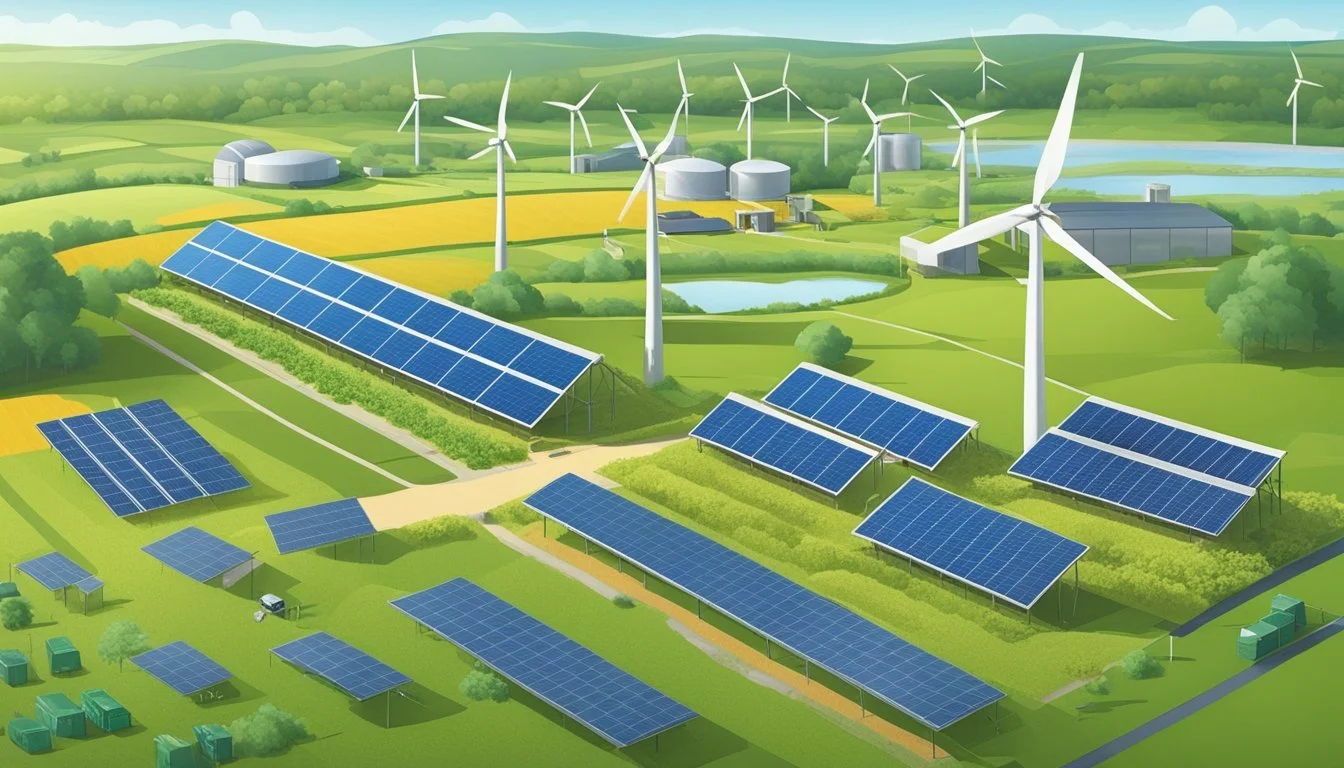Farming Communities in Rhode Island
Sustainable Practices and Local Impacts
Rhode Island's farming communities are thriving hubs of activity and innovation, drawing both locals and visitors to participate in a wide range of agricultural experiences. The state's small size belies the diversity and richness of its farming sector, which includes everything from cheese-making at Narragansett Creamery to bread-making workshops at Seven Stars Bakery. These hands-on activities not only provide people with new skills but also forge a deeper connection to the land and local producers.
Economic development has seen a positive trend, with the market value of farm-grown products in Rhode Island increasing significantly. This growth underscores the vital role agriculture plays in the state's economy. Community support has been instrumental, as evidenced by the numerous farmers’ markets, Community-Supported Agriculture operations, and farm stands that dot the region.
Farm Fresh Rhode Island serves as a central hub, providing resources and support for both farmers and consumers. By promoting local food initiatives and offering programs like Double Your SNAP/EBT, it ensures that fresh, local produce is accessible to all. This vibrant and supportive environment highlights how Rhode Island is fostering a sustainable and community-oriented agricultural landscape.
Historical Context of Farming in Rhode Island
Farming in Rhode Island has evolved significantly, from early native practices to current modern agricultural methods. This transformation includes changing land usage and shifts in farming technologies.
Development of Agriculture in Rhode Island
Early Rhode Island agriculture began with indigenous practices. The Sakonnet people cultivated native crops, utilizing sustainable methods. By the time English settlers arrived, farming expanded to include textiles, meat, and vegetables.
Throughout the 1800s, farming practices adapted to meet growing demands. Notable developments include the introduction of the Rhode Island Red hen and the Little Compton Goose, significant to local farming history. These developments illustrate evolving agricultural methods and the importance of specific livestock.
Transition from Traditional to Modern Farming Practices
The mid-20th century marked a shift from traditional farming to more modern practices. In 1945, Rhode Island had extensive farmland, totaling 264,734 acres. Over the years, this number dwindled due to urbanization and industrialization, reducing farmland to 61,223 acres.
Modern farming in Rhode Island incorporates advanced technologies and sustainable practices. Efforts to preserve farmland have become critical, with areas like Avondale Farm Preserve representing some of the state’s oldest and most significant agricultural lands. These efforts highlight the ongoing importance of maintaining agricultural viability in the region.
Current State of Rhode Island Farming
Rhode Island has made notable strides in its agricultural sector, showing growth in both the number of farms and the amount of farmland. This growth highlights the region's commitment to sustainable agriculture and the importance of local food production.
Types of Farms and Crops
The agriculture landscape in Rhode Island is diverse. The number of farms has increased by 1% since 2017 and by 23% since 2002, totaling more than 1,100 farms. These farms range from small family-run operations to larger commercial enterprises.
Common crops in Rhode Island include nursery and greenhouse plants, which represent a significant portion of the market. Additionally, fruits, vegetables, and livestock farming play crucial roles. The variety of produce supports local food initiatives and ensures a steady supply for farmers' markets and community-supported agriculture programs.
Economic Impact of Farming
The economic impact of farming in Rhode Island is substantial. In 2022, the market value of crops, including nursery and greenhouse crops, exceeded $72 million. Sustainable farming practices and local food production contribute to the region's economic viability.
Farming also supports various other sectors, such as local restaurants, farmers' markets, and agri-tourism. Washington County is notable for its large concentration of agricultural land, with 27,496 acres dedicated to farming, representing a significant increase from previous years.
Urban Farming and Community Gardens
Urban farming and community gardens have become integral to Rhode Island's agricultural scene, particularly in cities like Providence. These initiatives address food security and promote sustainable practices. Small urban farms and community gardens provide fresh produce to local residents and often focus on organic methods.
Programs in urban areas encourage community involvement and education about gardening and nutrition. These spaces not only offer food but also serve as social hubs, reinforcing the community spirit and promoting healthy living.
Governmental Role and Agricultural Policies
The agricultural sector in Rhode Island is supported through a variety of state, federal, and local initiatives aimed at preserving farmland, promoting sustainable practices, and enhancing economic viability. These policies and investments are essential for fostering a thriving agricultural community in the state.
State Support for Agriculture
Rhode Island provides substantial support for its agricultural sector. The Rhode Island Food Policy Council (RIFPC) plays a critical role by advocating for policies that protect farmland and promote sustainable practices. The state has increased its farmland from 56,864 acres in 2017 to 59,076 acres in 2022.
The Rhode Island Department of Environmental Management (RIDEM) offers several programs through its Division of Agriculture and Forest Environment. These programs focus on enhancing the agricultural viability of the state, ensuring that farming remains a profitable and sustainable occupation.
Federal Investments and Grants
Federal support is pivotal for Rhode Island's agriculture. The U.S. Department of Agriculture (USDA) offers various grants and funding opportunities. The 2023 Farm Bill introduces measures to protect agricultural land, expand SNAP access, and promote equity within the food system.
USDA grants help farmers implement soil-regenerative practices, improve infrastructure, and increase market access. These investments are crucial for enhancing food security, climate resilience, and economic development within the state, making them integral to Rhode Island's agricultural policies.
Local Agriculture and Seafood Act (LASA)
LASA is a significant local initiative that supports Rhode Island’s farmers and fishers. The act provides grants that help farmers and seafood businesses expand operations, innovate, and improve sustainability. These grants also foster local food supply chains, ensuring the availability of fresh, local produce and seafood.
Supported by the Rhode Island General Assembly, LASA promotes the state's agricultural and seafood industries by funding projects that enhance their economic viability and meet community needs. This initiative is a cornerstone of Rhode Island's local agricultural policies, boosting competitiveness and sustainability.
Socioeconomic Factors and Community Involvement
Farming communities in Rhode Island are profoundly influenced by community-supported agriculture, farmer’s markets, and various advocacy and educational initiatives. These elements play a crucial role in enhancing food security, fortifying the local economy, and fostering strong community ties.
Community Supported Agriculture (CSA)
Community Supported Agriculture (CSA) programs involve consumers directly supporting local farms by purchasing shares of the harvest in advance. This model provides farmers with a more predictable income and helps with cash flow during planting seasons. Consumers benefit by receiving fresh, locally-grown produce and forming a closer connection to the source of their food.
CSAs often include a diverse range of products such as vegetables, fruits, dairy, and occasionally meats. These programs enhance food security by ensuring more consistent access to local, nutritious foods. Community involvement is strengthened through farm visits, member events, and volunteer opportunities.
Farmer's Markets and Local Economy
Farmer's markets are vital hubs for connecting local producers with consumers, sustaining the economy. In Rhode Island, these markets contribute significantly to the local economy by enabling direct sales, reducing the need for intermediaries. They also offer farmers a venue to showcase a wide array of goods including fresh produce, artisanal products, and handmade crafts.
Benefits:
Economic Growth: Supports small-scale farmers and artisans, keeping money within the community.
Food Security: Increases access to fresh, nutritious food.
Community Engagement: Provides a social space for community members.
These markets also boost local economies by attracting visitors and supporting surrounding businesses, creating a ripple effect of economic benefit.
Advocacy and Educational Programs
Various advocacy and educational programs in Rhode Island aim to support agricultural practices and strengthen community ties. Organizations work tirelessly to promote sustainable farming techniques and ensure farmland preservation. The Rhode Island Food Policy Council, for instance, focuses on policy advocacy to protect agricultural lands and support farmers.
Educational initiatives often include workshops, farm tours, and youth programs, emphasizing the importance of sustainable farming and local food production. These programs enhance public understanding of food systems, advocate for food security, and encourage community involvement in agricultural practices.
By participating in these programs, community members can gain valuable knowledge, contribute to advocacy efforts, and support the sustainability of local farming communities.
Environmental Impacts and Sustainable Practices
Farming communities in Rhode Island are increasingly adopting sustainable practices to enhance the resilience of their agricultural systems and protect local ecosystems. These efforts are critical for maintaining natural resources and ensuring a stable food supply in the face of climate change.
Sustainable Practice Adoption on Farms
Rhode Island farmers are implementing various sustainable agriculture techniques to minimize environmental degradation. One notable practice is soil-regenerative farming, which involves cover cropping, no-till farming, and organic amendments. These methods help improve soil health, enhance water retention, and reduce the need for chemical fertilizers.
Additionally, many farms are integrating renewable energy sources such as solar panels and wind turbines into their operations. These energy systems reduce reliance on fossil fuels, lower greenhouse gas emissions, and contribute to the state's climate resilience efforts.
Water conservation is another crucial component. Farmers are increasingly using efficient irrigation systems such as drip irrigation, which reduces water usage and helps protect local water sources. By adopting these sustainable practices, Rhode Island's farming communities are working to create a more resilient and environmentally-friendly agricultural sector.
Impact of Farming on Rhode Island's Ecosystems
Farming has a significant impact on the state's ecosystems. The preservation of green spaces and agricultural land is vital for maintaining biodiversity and natural resources. Unfortunately, Rhode Island is the 6th most threatened state in terms of farmland loss, with the highest average cost of agricultural land in the nation.
Unsustainable farming practices can lead to soil erosion, water contamination, and loss of habitat for wildlife. However, initiatives such as the Rhode Island Food Policy Council’s efforts aim to protect agricultural land and promote environmentally conscious farming methods.
By preserving green spaces and implementing sustainable agricultural practices, Rhode Island's farming communities help mitigate negative environmental impacts and support the health of the state's ecosystems. These actions are critical for ensuring long-term ecological balance and food security.
Challenges and The Road Ahead
The agriculture sector in Rhode Island faces notable obstacles such as loss of farmland and pressure on small farms. Addressing these issues is crucial for economic development, food security, and sustaining rural communities.
Loss of Farmland and Green Spaces
Rhode Island has seen substantial farmland loss, driven by increased development pressure and population growth. Between 1997 and 2017, the state lost over 9,000 acres of farmland, equating to more than an acre per day. This reduction impacts not only the agricultural sector but also biodiversity and environmental health. High property taxes further strain farmers, making it financially challenging to maintain large tracts of land.
Investment in farmland protection programs and sustainable practices becomes vital. The Rhode Island Food Policy Council highlights the need for sufficient funding to preserve existing farmland. Establishing protective measures and incentivizing regenerative agriculture can help mitigate ongoing loss and support long-term sustainability.
Future of Small Farms and Rural Communities
Small farms in Rhode Island face unique challenges, including limited access to land and high operational costs. Despite these hurdles, there is a slight upward trend in farm numbers and total farmland area, as reported in the latest federal Census of Agriculture. This indicates potential for growth and resilience within the sector.
Support networks like the Young Farmer Network provide essential education and advocacy, helping beginning farmers navigate land access issues. Investment in local food systems and policies fostering economic development in rural areas can further strengthen small farms. Enhancing food security through regional food councils and community-supported agriculture (CSA) programs also contributes to a more robust and sustainable agricultural community.






